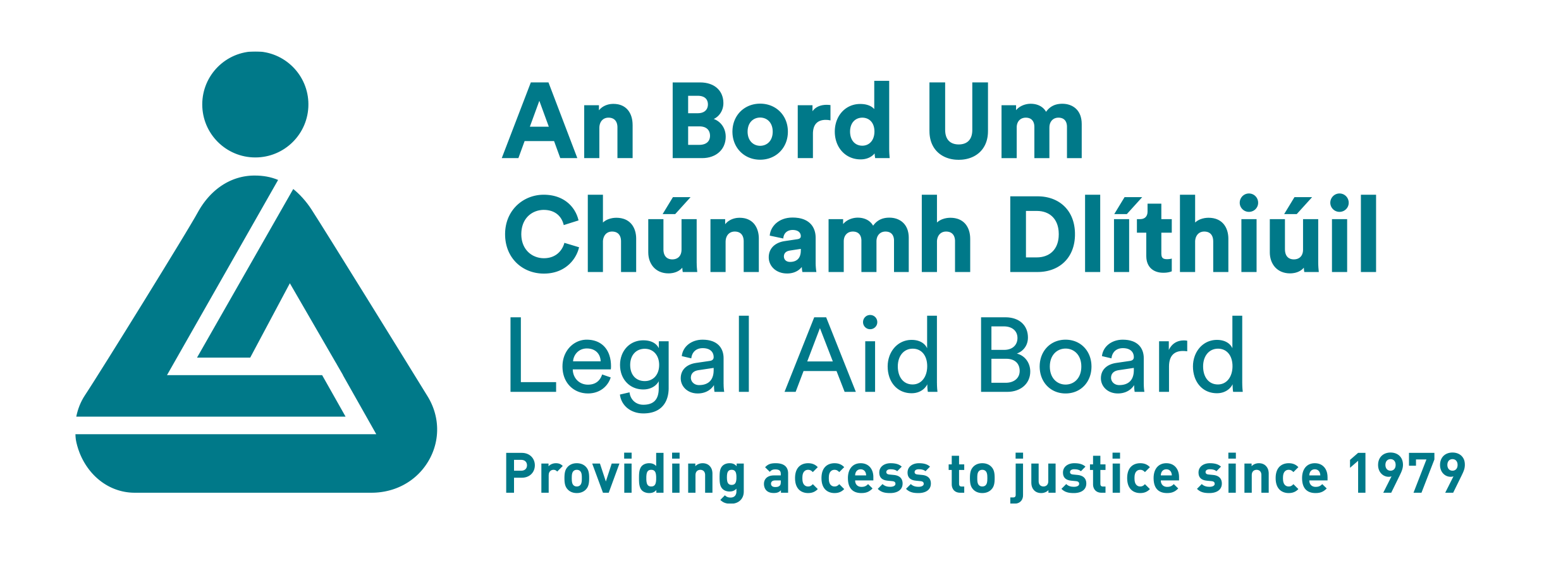Privacy & Cookie Policy
Privacy Policy
For general web browsing no personal information is revealed to the Legal Aid Board. The following information is automatically collected and stored when visiting the Legal Aid Board site:
- The IP address of the visitor's web client
- The top-level domain name used (for example .ie, .com, .org, .net)
- The previous website address from which the visitor reached the site, including any search terms used
- Clickstream data which shows the traffic of visitors around the website (for example pages accessed and documents downloaded)
- The type of web browser used by the website visitor
- The date and time the visitor accesses the site
Some of the above information is used to create summary statistics which allow the Legal Aid Board to assess the number of visitors to the site, identify what pages are accessed most frequently and generally, help to assist in the future development of the Legal Aid Board website.
By sending an email, you may be sending personal information such as name, address, and e-mail address. The Legal Aid Board may store the name, address, and e-mail address of a requester in order to respond to requests or otherwise resolve the subject matter of the e-mail. Please also see our confidentiality page.
Cookie Policy
What is a cookie?
A cookie is a small text file, often encrypted, that is placed in your web browser on your PC, telephone, tablet or other device when you visit a website. During the course of your visit to that website, and on subsequent visits, it sends information from your browser about your visit(s).
A cookie can be classified by its lifespan and the domain to which it belongs. By lifespan, a cookie is either a:
- session cookie which is erased when you close the browser or
- persistent cookie which remains on your computer/device for a pre-defined period of time.
As for the domain to which it belongs, there are either:
- first-party cookies which are set by the owner or creator of the website you are visiting
- third-party cookies which are not set by the owner or creator but by third parties who run ads, widgets and other elements loaded on to the website.
Some cookies are necessary, to enable the website work properly, they preserve the session state as you move through the pages and this is important for example when you complete a form on a website.
Other cookies gather anonymous statistical information about your use of a website eg what pages are visited, for how long etc. These cookies are used for analytical purposes and the most common ones used are Google Analytics.
Further information on cookies can be found at: http://ec.europa.eu/ipg/basics/legal/cookies/index_en.htm
What cookies do the Legal Aid Board use?
The Legal Aid Board uses the following cookies:
| Cookie Name | Lifespan | Purpose |
| ASP.NET_SessionId | Session | Preserve the session while visitor is moving between pages |
| CookieConsent | 1 Year | Remembers clicking cookie button |
|
_ga _gid _gat |
2 years 1 day 1 day |
Google analytics of anonymous statistical data |
| ads/ga-audiences | Session | To re-engage visitors based on the visitor's online behaviour across websites. |
The Legal Aid Board website does not contain any third party cookies.
How to Control and Delete Cookies
Web browsers accept cookies by default but you can usually change the web browser’s settings to refuse new cookies, disable existing ones or simply let you know when new ones are sent to your device.
In order to do this, follow the instructions provided by your browser (usually located within the “Help”, “Tools” or “Edit” facility) or you can click on the links below to access instructions from some of the most popular browsers:
Please be aware that if you refuse or disable cookies then some of the website’s functionality may be adversely affected for you. In addition, disabling a cookie or category of cookie does not delete the cookie from your browser and would need to be done by you within your browser if you so wish.
Changes to our Cookie Policy
Any changes to the Legal Aid Board’s use of cookies for this website will be posted here.
Contact Information
If you have any queries in relation to this notice, please contact:

